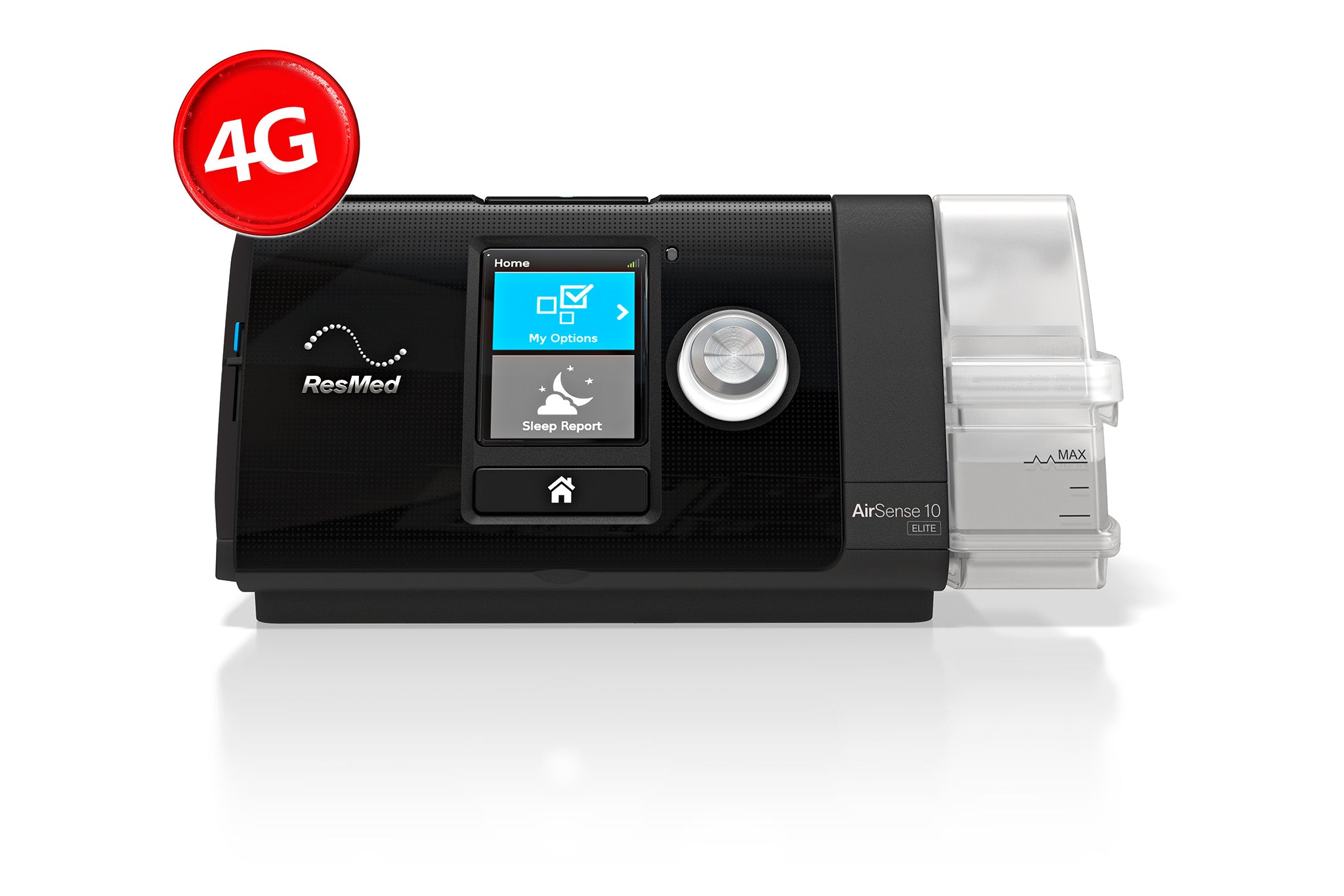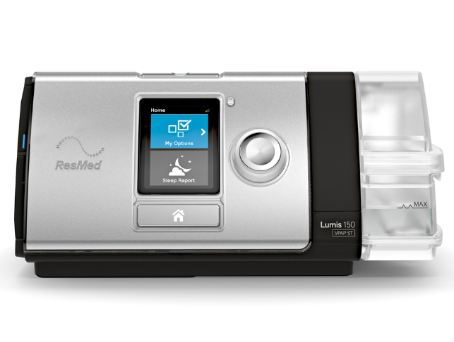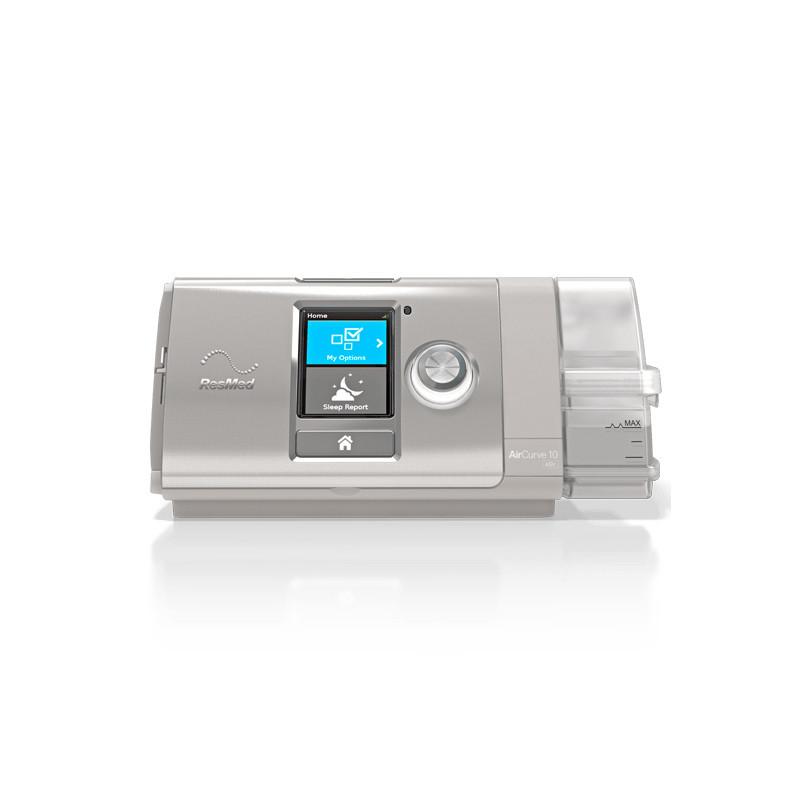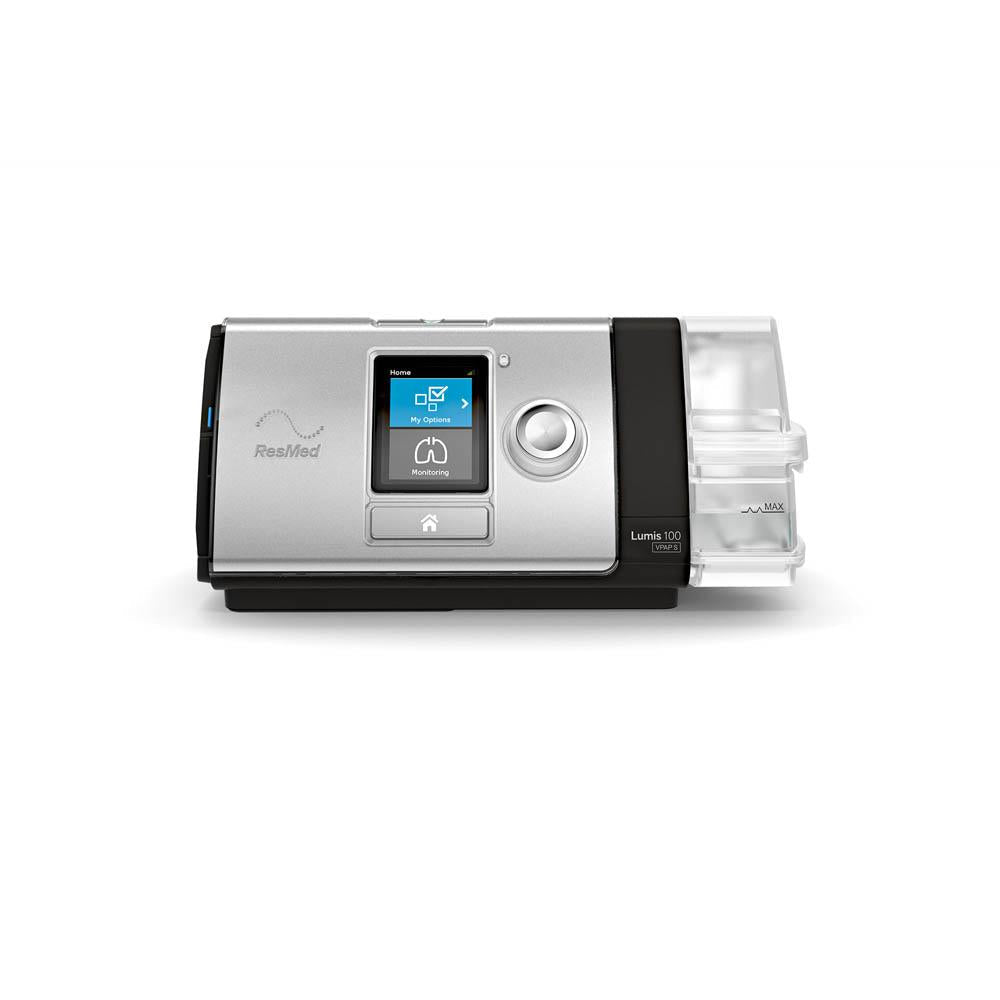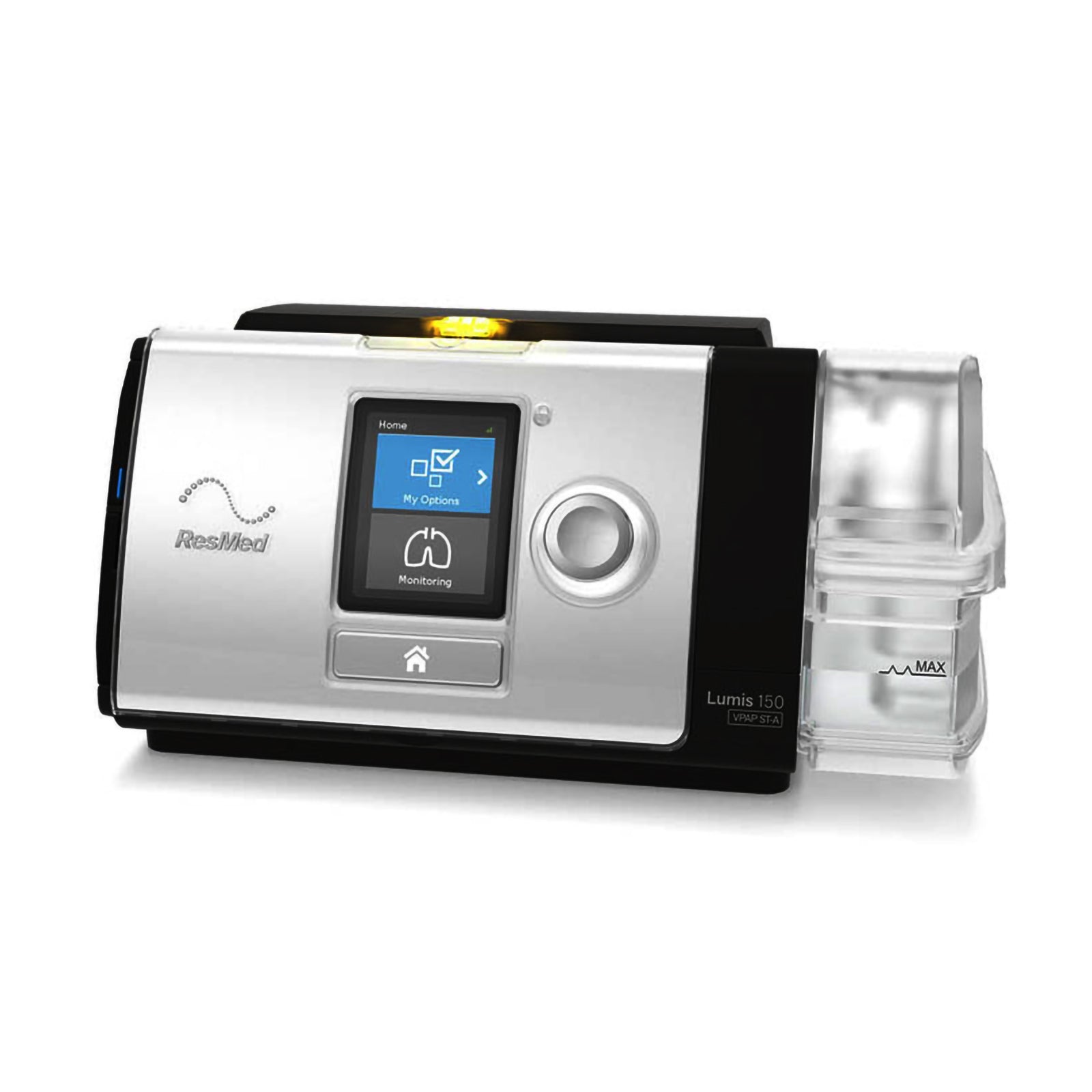Shop Our Range of CPAP Machines
CPAP Machines
Sleep apnea (otherwise known as sleep apnoea) impacts millions globally every year. Significantly affecting a person’s quality of life and health, this disruptive condition requires a comprehensive and holistic solution. NSW CPAP offers a range of continuous positive airway pressure (CPAP) machines and accessories to facilitate sleep apnea therapy and transform nights from a struggle to peaceful rest.
What Is Sleep Apnea?
Often misunderstood as simply snoring, sleep apnea–especially obstructive sleep apnea–poses a far more serious threat to one’s health than many realise. This condition is marked by repeated pauses in breathing during sleep, which can lead to numerous adverse effects on your health.
In obstructive sleep apnea, the throat muscles relax excessively, blocking the airway and momentarily preventing a person from breathing. Central sleep apnea, though less common, is when the brain fails to signal to the muscles responsible for breathing, causing periods of silence interspersed with gasps or awakenings. Both instances can be incredibly uncomfortable and alarming for those with either condition and cause repeated disruptions in the natural cycle of sleep.
If left untreated, sleep apnea can lead to a number of health complications. These can include:
- High blood pressure
- Heart disease
- Diminished mental health
- Irritability
- Loss of concentration
Managing sleep apnea begins with understanding and recognising its signs and symptoms.
Loud, chronic snoring is often found in obstructive sleep apnea, whereas central sleep apnea tends to manifest in subtler ways. One of the most common treatment methods for sleep apnea is using a CPAP machine. Those using CPAP machines often refer to a healthcare professional to tailor their sleep apnea treatment to their specific needs and adjust the settings.
What is a CPAP Machine?
A CPAP machine is a type of device that can help to treat sleep apnea. CPAP machines work by delivering a steady stream of air through a hose connected to a mask that covers either your nose, mouth, or both. This air pressure ensures that the throat’s muscles do not close during sleep, allowing for unobstructed and easy breathing.
By maintaining open airways, CPAP machines significantly reduce the rate of breathing pauses during sleep, giving those living with sleep apnea a peaceful and rejuvenating night of rest. This mechanism not only improves sleep quality but also lowers the risk of severe health issues associated with obstructive sleep apnea.
How CPAP Machines Help You Achieve Restorative Sleep?
Ingeniously designed to combat the challenges of sleep apnea, a CPAP device can help alleviate the symptoms and issues experienced by those afflicted with this condition. By providing a steady stream of air through a hose to a mask that gently covers the nose, mouth, or both, CPAP therapy maintains open airways. This continuous air pressure acts as an invisible pillar, holding the airway open to prevent collapses that cause the breathing interruptions characteristic of sleep apnea.
With this consistent support, CPAP therapy significantly diminishes the frequency and severity of breathing pauses and promotes a night of uninterrupted and rejuvenating sleep. CPAP machines not only improve the quality of your sleep but can help reduce risks associated with sleep apnea, such as high blood pressure or heart disease.
Taking a Closer Look at Sleep Disorders
As a prevalent sleeping disorder, sleep apnea is characterised by repeated interruptions in breathing during sleep. These pauses, known as apneas, can last from a few seconds to minutes and may occur 30 times or more an hour. Sleep apnea disorders generally come in one of three forms that a healthcare professional can diagnose.
- Obstructive Sleep Apnea (OSA): The most common form, where throat muscles intermittently relax and block the airway during sleep.
- Central Sleep Apnea (CSA): Less common, this type occurs when the brain fails to send the proper signals to the muscles that control breathing.
- Complex Sleep Apnea Syndrome (CompSAS): Also known as treatment-emergent central sleep apnea, it is a combination of both obstructive and central sleep apnea.
Understanding which type of sleep apnea you may suffer from is incredibly important for sleep therapists to determine which treatment will be the most effective one for you.
Types of CPAP Machines
In order to treat obstructive sleep apnea or similar disorders, sleep therapists are likely to recommend using a CPAP machine. You may require different features from your sleep apnea machine and at NSW CPAP, we offer a diverse range of sleep therapy devices to choose from. Additionally, you can purchase kits that come with a CPAP mask to pair with your new device.
Within our collection of sleep therapy devices, we offer:
- Standard CPAP Machines: These are the most common type of CPAP devices, offering a single, continuous pressure setting throughout the night. This consistent air pressure keeps the airway open, preventing the breathing interruptions characteristic of obstructive sleep apnea.
- APAP (Automatic Positive Airway Pressure) Machines: These smart devices automatically adjust air pressure levels throughout the night to accommodate your changing needs, ensuring optimal comfort and effectiveness.
- BiPAP (Bilevel Positive Airway Pressure) Machines: BiPAP machines provide two levels of air pressure – a higher pressure for inhalation and a lower one for exhalation, ideal for users who require stronger respiratory support.
- Travel CPAP Machines: For sleep apnea patients on the go, these compact and lightweight devices ensure you don't miss a night of quality sleep, no matter where you are.
This tailored selection ensures that whether you're treating obstructive sleep apnea, central sleep apnea, or require a more flexible air pressure solution, you'll find a device that ensures you receive quality sleep apnea therapy.
Sleep Apnea CPAP Machines: How to Choose the Right One
When choosing whether a fixed pressure device or automated machine is right for you, it is highly recommended that you seek out a licensed healthcare professional. Sleep therapists will often have the most nuanced understanding of your particular sleep disorder and can provide you with vital information to inform your purchase choice.
At NSW CPAP, our approach is grounded in understanding your unique needs through personal consultation. Our experts understand the individual and personalised nature of purchasing a CPAP machine and will ensure you feel confident in your choice. We consider factors such as sleep patterns, the severity of your apnea, comfort preferences and more.
FAQs
What are the pros and cons of using a CPAP machine?
CPAP therapy offers significant benefits for those who suffer from sleep apnea by improving sleep quality and overall health. Known for reducing sleep interruptions, sleep therapy allows for a deeper and more restorative night's rest that enhances daytime energy and alertness. This contributes to better overall health, reduces the risk of several conditions, such as high blood pressure and heart disease, and eliminates disruptive snoring.
However, therapy often requires an adjustment period. Some users may experience discomfort or dryness in the nose or throat. Others may even feel claustrophobic while wearing their masks. Additionally, regular maintenance and care for the device and its components are also necessary to ensure ongoing effectiveness and hygiene, which can be difficult for busier individuals to remember.
How often should a CPAP machine be replaced?
A CPAP device generally has a lifespan of approximately 5 to 10 years maximum. Regular maintenance and timely replacements of individual parts can help ensure your device functions for as long as possible, but a replacement will eventually be required. If you ever feel as if your device is not functioning correctly, cease using it immediately and refer to the expertise of a licensed professional to prevent any risks to your health.
Are CPAP machines covered by insurance or Medicare?
While CPAP machines are not typically covered by Medicare, private health insurance may offer partial support. We highly recommend consulting with your insurance provider for more detailed information on whether a CPAP machine is covered by them.
Other treatment options for sleep apnea
Alternative treatments to CPAP therapy do exist and may be suitable for certain individuals, depending on their specific conditions and needs. For some, lifestyle modifications such as weight loss or changing sleep positions can significantly alleviate symptoms. Oral appliances that adjust the position of the jaw or tongue can be effective for mild to moderate cases. In certain situations, surgery might be considered to remove or adjust tissue obstructing the airway. Additionally, BiPAP therapy, which offers variable pressures for inhalation and exhalation, may provide a viable alternative for those who struggle with CPAP therapy. Always discuss your options with a licensed healthcare professional to find the most suitable approach for managing your sleep apnea.
About NSW CPAP
NSW CPAP is committed to offering a comprehensive range of sleep apnea machines that you can use to treat your sleeping disorder. Offering more than just devices, we aim to provide exceptional support and ensure you are given access to the latest in CPAP technology. Our knowledgeable staff are ready to guide you through our selection, from CPAP masks to advanced CPAP devices, ensuring you find the perfect fit for your therapy needs. Shop CPAP machines with us and experience the difference that quality, compassion, and expertise can make today.
- Choosing a selection results in a full page refresh.
- Press the space key then arrow keys to make a selection.
